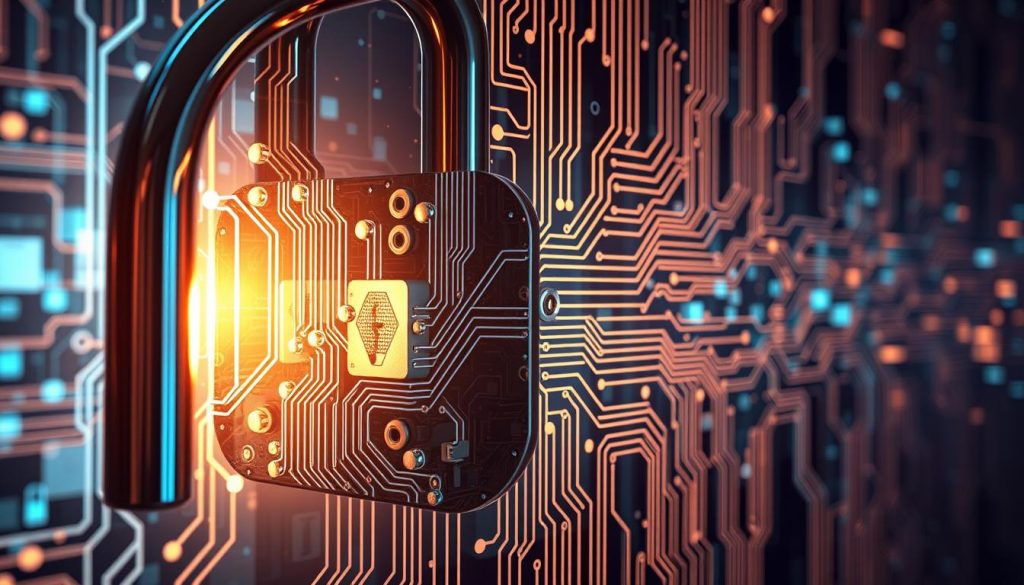You might not know how much of your online life is watched. Router logs and ISP monitoring can show a lot about what you browse.
A massive ad fraud campaign was found by Human’s Satori Threat Intelligence team. They found 224 malicious apps with over 38 million downloads, as BleepingComputer reported. This shows how big the problem of cybersecurity threats is.
It’s important to know what info is gathered and how it’s used. This info helps you protect your online safety.
Key Takeaways
- Router logs and ISP monitoring can reveal your browsing habits.
- Cybersecurity threats are on the rise, with incidents like the massive ad fraud campaign.
- Understanding the information collected about you is crucial.
- You can take steps to protect your online security.
- Being aware of the risks is the first step to safeguarding your online activities.
Understanding Router Logs
With more IoT devices, keeping your home network safe is key. Cybercriminals are targeting smart devices on home networks. Router logs help spot security threats by showing network activity.
What Are Router Logs?
Router logs record events on your network, like devices and data they send. They show websites visited and devices connected. Knowing what they are helps improve network security.
Importance of Router Logs
Router logs give a detailed look at your network. They’re crucial for Internet of Things Security. They help monitor IoT devices like smart TVs and cameras.
By checking logs, you can spot security threats early. The FBI and tech giants warn about IoT vulnerabilities. Regular log checks help protect your network.
How to Access Your Router Logs
To see your router logs, log into your router’s admin interface. The steps vary by router model. Check your manual or the manufacturer’s site for help.
With access, you can analyze the logs for security issues. Regular checks are vital for network safety.
What ISPs Can See
Knowing what your ISP can see is key in today’s digital world. Your ISP connects you to the internet. They can watch many parts of your online life.
Data Collection Practices
ISPs use many ways to gather data on you. They log the sites you visit and how much data you use. Even smart TVs send data to others without telling you, like what you watch and where you are.
Types of Data Monitored by ISPs
ISPs can watch a lot of things. They see the sites you visit and what you watch online. This helps them make a detailed picture of how you use the internet.
They can also see what devices are on your network. This lets them know which devices are being used and how.
To keep your online life private, it’s good to know about these things. Using a VPN can help hide your internet use from your ISP.
Legal Reasons for Monitoring
ISPs might have to watch and keep some data by law. This is for things like following copyright laws or catching illegal activities. The rules about this vary by country, trying to balance security and privacy.
Knowing about these digital privacy risks helps you protect yourself online. Being informed lets you make smarter choices about your internet use and how to keep your data safe.
Your Online Privacy and Security
As you explore the digital world, your privacy and security are always at risk. With more devices connected in your home, the threats grow. It’s key to know the dangers and how to keep your data safe.
Common Threats to Your Privacy
Smart home gadgets are handy but can be risky. For example, smart TVs can track what you watch. To stay private, turn off features like Automatic Content Recognition (ACR) and set your privacy settings yourself. Also, choose streaming apps that keep your data safe.
Other dangers include data leaks, malware, and unauthorized access. Knowing these risks is the first step to keeping your online space safe.
Best Practices for Protecting Your Data
To keep your online security strong, follow some key steps. Use strong, unique passwords and turn on two-factor authentication when you can. Also, keep your devices and software up to date to fix security holes.
For your smart home, change default passwords and set privacy options to share less data. Using a Virtual Private Network (VPN) can also protect your internet use by encrypting it.
Key Actions:
- Disable unnecessary features like ACR on smart TVs.
- Use secure, end-to-end encrypted streaming services.
- Regularly review and update privacy settings on all connected devices.
By following these tips, you can greatly improve your online privacy and security. This will help you avoid common dangers from smart home devices.
Analyzing Your Router Logs
To keep your internet activity private, you need to know how to analyze your router logs. Your router logs contain a record of all the activities that have taken place on your network. They are a valuable resource for identifying potential security threats.

Identifying Unusual Activity
One of the primary reasons to analyze your router logs is to identify unusual activity. This could indicate a security breach. Look for unfamiliar devices connected to your network or unusual login times. Regular monitoring can help you detect potential threats early, allowing you to take action before a minor issue becomes a major problem.
- Unrecognized devices connected to your network
- Unusual patterns of internet usage
- Login attempts from unknown locations
Filtering and Searching Router Logs
Router logs can generate a vast amount of data, making it challenging to find specific information. Learning how to filter and search through these logs is crucial for efficient analysis. Most modern routers allow you to filter logs by type, such as security events, system events, or connection logs.
- Access your router’s web interface
- Navigate to the logs section
- Apply filters to narrow down the information
By regularly analyzing your router logs and staying vigilant, you can significantly enhance your data breaches prevention efforts. This helps protect your smart devices from malware and spyware.
How ISPs Monitor Internet Usage
ISPs use advanced methods to watch over your internet use. This helps them spot possible security risks. It’s key for keeping networks safe and following the law.
Traffic Analysis Methods
Traffic analysis looks at data moving between your device and the web. ISPs use it to see what sites you visit and how much data you send.
Some ways ISPs analyze traffic include:
- Protocol analysis: They check the data transfer protocols, like HTTP or FTP.
- Traffic volume analysis: They measure how much data you send over time.
- Traffic pattern analysis: They look at when and how often you send data.
Deep Packet Inspection Explained
Deep packet inspection (DPI) is a detailed way ISPs check your internet use. It’s more than just looking at data flow. DPI digs into the data itself to find specific info.
DPI is used for many things, like:
- Finding malware and other security risks.
- Managing how much bandwidth you use.
- Checking if you follow legal rules.
Limitations of ISP Monitoring
Even with advanced tools, ISPs have limits. For example, encrypted data, like HTTPS, can make DPI less effective.
Recent events show how important it is to know these limits, especially for security. Using VPNs, for example, can hide your IP address. This makes it harder for ISPs to track your online activities.
| Method | Description | Limitations |
|---|---|---|
| Traffic Analysis | Examines data flow patterns | Limited insight into encrypted data |
| Deep Packet Inspection | Examines content of data packets | Can be thwarted by encryption; raises privacy concerns |
| VPN Usage | Masks IP addresses and encrypts data | Can be blocked or throttled by ISPs |
Your Rights as an Internet User
Knowing your rights online can make your internet use safer and more private. As you explore the digital world, it’s key to know these rights. This helps protect you from online dangers.
Understanding Your Privacy Rights
Your online privacy is covered by many laws and rules. You have the right to manage your personal data and how it’s used by internet services.
One important part of your privacy is knowing how your data is used. ISPs must tell you how they collect and use your data. Knowing this helps you make smart choices online.
Key Laws Governing ISP Monitoring
Many laws control how ISPs watch your online activities. These laws aim to keep you safe while also protecting your privacy. Knowing these laws helps you understand online privacy better.
| Law/Regulation | Purpose | Impact on ISP Monitoring |
|---|---|---|
| Communications Assistance for Law Enforcement Act (CALEA) | Requires ISPs to help law enforcement. | Limits ISP monitoring to legal reasons. |
| Electronic Communications Privacy Act (ECPA) | Protects your online communications. | Blocks unauthorized access to your data. |
| General Data Protection Regulation (GDPR) | Protects EU citizens’ data and privacy. | Affects global ISP data handling. |
By learning about these laws and your privacy rights, you can protect your online safety and privacy. Being informed is your best defense against online threats.
Tools for Enhanced Security
Boosting your online security means using top-notch tools and smart practices. As you explore the digital world, having the right tools is key. They help keep your privacy and security safe.
VPNs: How They Work
A Virtual Private Network (VPN) encrypts your internet, making it hard for others to see your data. It hides your IP address, giving you a safe way to browse, especially on public Wi-Fi. When picking a VPN, look at encryption, server locations, and logging to get the best protection.
Firewall Settings to Consider
Firewalls block unwanted internet traffic, keeping your device safe. Tweaking your firewall settings can boost your security. Make sure it’s turned on and set to block unauthorized access. You can also add software firewalls for extra protection.
Router Security Features
Your router is your network’s entrance, so its security is vital. Look for WPA3 encryption, guest networks, and firmware updates. Change default passwords and turn off remote management to keep your router safe. These steps help protect your network from threats.
Using these tools and tips can help you stay safe online. Being informed and active is crucial for a secure digital life.
Reducing Your Digital Footprint
Reducing your digital footprint is a smart move to keep your online identity safe. It’s important to know how to lessen your online presence. This helps protect your sensitive information.
Strategies to Minimize Tracking
To cut down your digital footprint, you need to use privacy-focused tools. Choose browsers and search engines that don’t save your personal info. Also, turn off third-party cookies and use blockers to track less about you.
- Use privacy-centric browsers and search engines
- Disable third-party cookies
- Employ tracker blockers
- Regularly review and adjust your privacy settings on social media platforms
Importance of Secure Connections
Secure connections are key to keeping your data safe. Virtual Private Networks (VPNs) encrypt your internet, making it hard for trackers to follow you. Also, make sure websites use HTTPS to add more security.
| Security Measure | Description | Benefit |
|---|---|---|
| VPNs | Encrypts internet traffic | Protects data from interception |
| HTTPS | Secures data transfer between your browser and websites | Ensures confidentiality and integrity of data |
| Tracker Blockers | Blocks tracking scripts | Reduces data collection by third parties |

By using these strategies and knowing the value of secure connections, you can greatly reduce your digital footprint. This not only keeps your privacy safe but also helps prevent data breaches. It’s especially important for smart home security.
Configuring Your Router for Privacy
By controlling your router’s settings, you can lower the risk of data breaches. Changing your router’s settings for privacy is key. It boosts your online safety and guards against cyber threats.
Steps to Change Default Settings
Securing your router starts with changing its default settings. These settings are common and can be used by hackers. First, change the default admin password to a strong, unique one. You can do this by going to your router’s web interface through a browser.
Update Your Router’s Firmware: It’s vital to keep your router’s firmware updated. Updates fix security holes. Regularly check for and apply these updates to boost your router’s security.
Disable Remote Management: If you don’t need to manage your router remotely, turn off remote management. This stops unauthorized access. You’ll find this setting under ‘Advanced’ in your router’s settings.
Monitoring Access Logs
Watching your router’s access logs helps catch security threats early. Logs show who’s on your network and what they’re doing. To see these logs, log in to your router’s web interface and find the ‘Logs’ or ‘Status’ section.
- Check the logs often for odd activity that might mean a security issue.
- Use alerts or notifications if your router has them, to warn you of suspicious activity.
- Think about using extra security software to check your router logs and spot threats.
By following these steps and keeping an eye on your router’s settings and logs, you can greatly improve your online privacy and security. This protects you from malware, spyware, and other cyber dangers.
Alternatives to Traditional ISPs
With recent cybersecurity threats, looking for new ISPs is key. Traditional ISPs have always been there for us. But, they have limits when it comes to privacy and security. This has led people to look for other ways to get online.

Understanding Different Service Models
There are many different ISPs out there. Some focus on keeping your data safe with strong encryption. Others might offer fast speeds or reliable connections.
For example, some ISPs are experts in keeping IoT devices safe. This is important because of the growing need for Internet of Things Security.
- Privacy-focused ISPs that use end-to-end encryption.
- Speed-oriented ISPs that offer high-bandwidth connections.
- Reliability-centric ISPs that ensure consistent uptime.
Benefits of Using Smaller ISPs
Smaller ISPs often give you more personal service. They can tailor plans to fit your needs and offer better customer support. They also tend to be more open about how they handle your data.
This is comforting, especially after seeing Recent Cases of data misuse.
| Feature | Traditional ISPs | Smaller ISPs |
|---|---|---|
| Customer Service | Often automated and less personalized | More personalized and responsive |
| Data Handling | May sell data to third parties | More transparent, less likely to sell data |
| Security Focus | Varies, sometimes lacking in IoT security | Often prioritizes security, including IoT security |
When looking for a new ISP, think about what you need. Especially if you’re worried about privacy and security.
What to Do if You Suspect Monitoring
If you think your internet data is being watched, it’s key to spot the signs and act fast. Start by learning how to protect your digital privacy.
Signs Your Data May Be Compromised
There are a few signs that might mean your data is being monitored. Look out for:
- Unusual network activity, like devices you don’t know.
- Slow internet speeds, which could mean your ISP is slowing you down.
- Strange behavior from your devices, like sudden reboots or new software.
Keep an eye on your network activity to catch these signs early. Check your router’s logs for any odd activity.
Steps to Address Unauthorized Access
If you think your data is being watched, act quickly. Here’s what to do:
- Change your passwords: Update your Wi-Fi and router admin passwords to block unwanted access.
- Enable WPA3 encryption: If your router can, turn on WPA3 for better security.
- Update your router’s firmware: Make sure your router’s software is current to fix security holes.
- Use a VPN: A Virtual Private Network (VPN) encrypts your internet, keeping your data safe.
By following these steps, you can greatly improve your defenses against digital privacy risks. This will help keep your online activities safe from unwanted monitoring.
The Role of Encryption
Encryption is key to keeping your online activities safe. With more smart home devices and online threats, knowing about encryption is vital. It helps keep your online security strong.
Importance of HTTPS
HTTPS (Hypertext Transfer Protocol Secure) is a big deal for online safety. It makes sure data between your browser and websites is safe. Using HTTPS is key to protect sensitive info, like passwords and credit card numbers, from hackers.
When online, check for “HTTPS” in the URL and a padlock icon. These signs mean the site is secure. Also, many browsers and search engines warn against non-HTTPS sites, showing how important HTTPS is.

End-to-End Encryption Explained
End-to-end encryption keeps messages safe. Only the sender and receiver can read them. It’s crucial for messaging apps, emails, and file sharing.
Your data is encrypted on your device before sending. It stays encrypted until it reaches the right person. This way, even the service provider can’t see your data, keeping your info private and secure.
| Encryption Method | Description | Security Benefits |
|---|---|---|
| HTTPS | Encrypts data between your browser and a website | Protects sensitive information from interception |
| End-to-End Encryption | Encrypts data on your device before transmission | Ensures only the intended recipient can access the data |
By using HTTPS and end-to-end encryption, you boost your online security. This helps protect your smart home devices from threats.
Understanding Data Retention Policies
Your online data is not as fleeting as you might think. ISPs keep records, and knowing their retention policies is key.
Data retention policies outline how long internet service providers (ISPs) store your online activity info. This includes websites visited, data transferred, and devices used for internet connection.
Duration of Data Retention
The time ISPs hold onto your data varies a lot. It depends on the place and ISP policies. Some keep data for months, while others hold it for years.
- Legal Requirements: ISPs keep data as long as needed to follow government rules and law requests.
- Business Needs: ISPs also keep data for their operations, like network management and customer service.
Implications for Your Privacy
Knowing about data retention policies is vital for your privacy. It affects how your personal data is managed and safeguarded. Longer retention times raise the risk of data breaches and unauthorized access.
To safeguard yourself, consider these steps:
- Use a Virtual Private Network (VPN) to encrypt your internet traffic.
- Regularly check your ISP’s data retention policies and adjust your online habits.
- Be careful with public Wi-Fi, as it’s not always secure.
By staying informed and taking action, you can reduce your digital trace and boost your online safety.
The Future of Internet Monitoring
Internet monitoring is changing fast, thanks to new tech and cybersecurity threats. Looking ahead, we must grasp the new trends in monitoring and security.
Emerging Technologies in Monitoring
New tools are coming to improve internet monitoring. These include advanced data analytics and artificial intelligence. They help track and analyze online activities better, spotting security risks early.
Recent cases show how vital these new techs are against cybersecurity threats. For example, AI can spot unusual internet traffic signs of hacking or malware.
What You Can Expect Going Forward
As monitoring tech gets better, you’ll see more advanced tools. These might include stronger encryption, better intrusion detection, and enhanced privacy.
But, these improvements also bring new risks. The use of complex tech could open up new vulnerabilities. It’s key to keep up with these changes and their impact on your online safety.
To stay safe online, be alert and proactive. Check your security often, stay current with cybersecurity threats, and use the best internet practices. This will protect your digital world.
The Impact of Public Wi-Fi on Privacy
Public Wi-Fi networks are handy, but they can risk your online privacy. Using public Wi-Fi makes you a target for cybercriminals who find weaknesses in these networks.
Risks Associated with Public Networks
Public Wi-Fi can harm your privacy and security. Some major risks include:
- Data interception by hackers
- Malware distribution
- Man-in-the-middle attacks
- Unsecured connections
These dangers can let hackers into your personal data, threatening your Internet of Things (IoT) security. Knowing these risks helps you take the right steps to protect yourself.
Best Practices for Using Public Wi-Fi
To keep your privacy safe on public Wi-Fi, follow these tips:
- Use a Virtual Private Network (VPN) to encrypt your internet traffic.
- Stay away from sensitive info, like online banking or personal emails.
- Keep your device’s operating system and software current.
- Use two-factor authentication (2FA) whenever you can.
- Be careful with links and files you click or download.
By using these defenses, you can greatly improve your security and keep your privacy safe on public Wi-Fi networks.
It’s also important to know the risks of IoT devices on public networks. Make sure all your devices are secure and updated to keep your digital security strong.
Conclusion: Taking Control of Your Internet Privacy
Understanding router logs and ISP monitoring is key to protecting your digital privacy. Knowing how your internet activity is tracked helps you secure your online space. This way, you can lessen the risks to your smart home devices and online security.
Key Takeaways for Enhanced Security
Learning about online security is the first step to protecting your digital life. Start by setting up your router for privacy and using VPNs. Also, be careful when using public Wi-Fi to avoid Smart Home Vulnerabilities.
Proactive Steps for a Secure Online Presence
To keep your online presence safe, check your router logs for odd activity. Know your rights as an internet user and stay updated on new monitoring tech. These steps will greatly improve your digital privacy and security.

